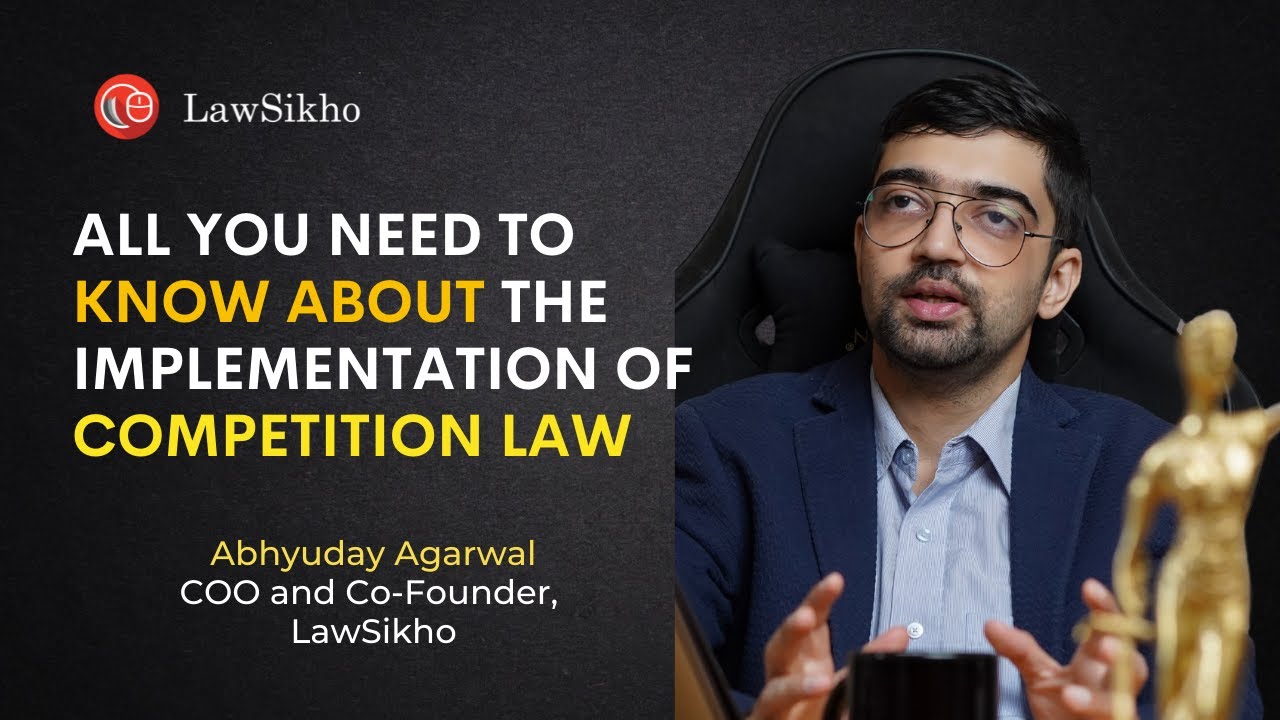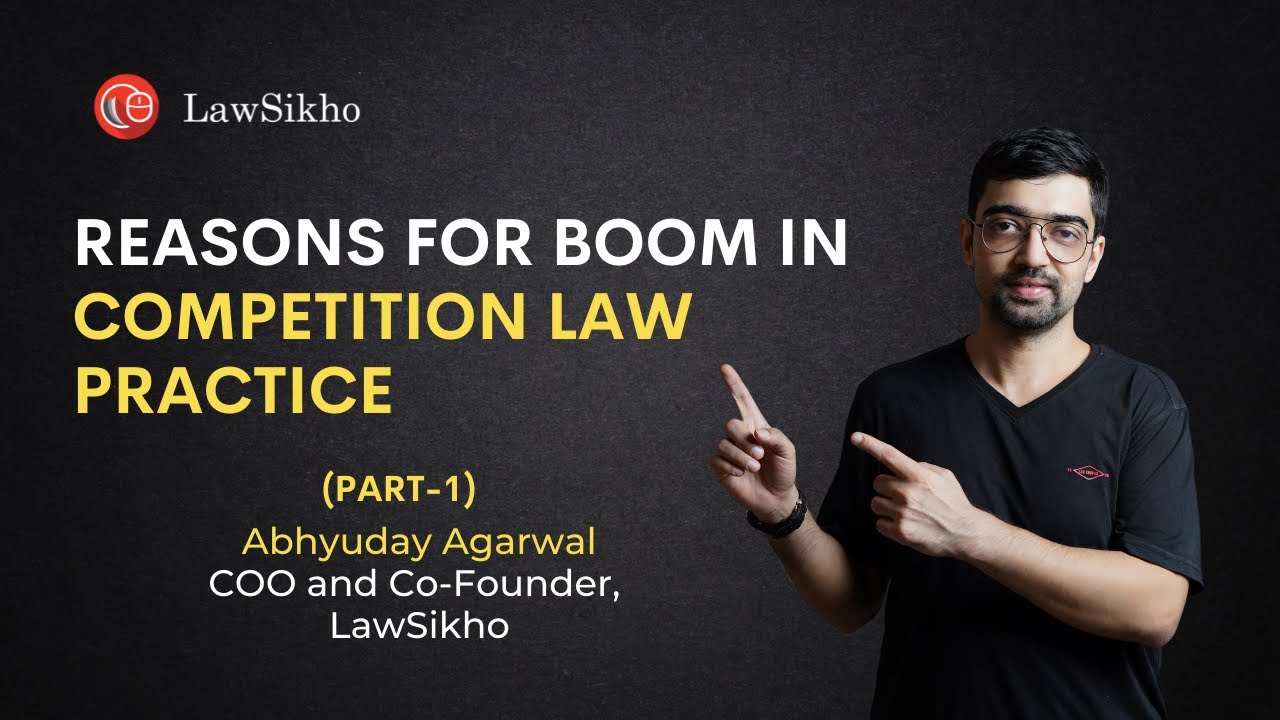Sports
Telecom
Statutory Authorities
Aviation
E-commerce
Big Data, AI & Blockchain
Introduction
“Google fined Rs 136 crore for anti-trust conduct”- Economic Times, February 09, 2018
“CCI to probe OYO and MakeMyTrip over confidential agreement”- Nasdaq October 29, 2019
“NCLAT upholds the CCI penalty of INR 6300 crores on cement firms”- Hindu Business Line July 25, 2018
“Amazon and Flipkart face an antitrust investigation in India”- January 14, 2020
The list of such news pieces has increased in the last 4-5 years. Competition law as a practice area has never been more in demand as it is now. Globalisation has resulted in India facing rising competition not only from domestic but international players as well making growth and market domination the key pursuit for all businesses alike. Today be it Jio, Amazon, Zomato, or DLF- all the leading companies seek to dominate their markets in the least possible time period. The basic business culture globally rests upon the principle of aggressive growth. This growth has been at the cost of all the rules of competition.
Competition law regulates the kinds of business practices, behaviour and contracts that such players can execute. While businesses strive to get a stronghold over the market in a particular sector, being able to lead beyond a certain level without violating competition laws involves a degree of tightrope walking. This is where competition lawyers are required.
If you are engaged in mergers and acquisitions or cross border transactions or in structuring any kind of business transactions or agreements with players in similar markets or collaborations, competition law is something you would need to take very seriously. It is not only applicable to high stake business transactions but also applies to the most common denominator involving sole proprietorships.
This is where the demand for competitive lawyers has witnessed a huge rise, especially in the last 7-8 years. The Competition Commission of India (“CCI”) seeks to keep a check on this aggressive behaviour being employed by every company or proprietorship today. It ensures that these companies, in order to have total control over the market, do not cross the lines by indulging in conduct such as collusive behaviour, heavy underpricing, unfair and unreasonable contractual restrictions, etc. With some of the bold decisions mentioned above, CCI is now playing on the forefront and is coming out as one of the strongest regulators in the country. This is where an efficient competition lawyer can contribute significantly.
On the transaction side, as of 1 September 2019, CCI has cleared as many as 610 merger filings with an average of 50-60 filings per year which has only been increasing. It has cleared a few of the major and complex global deals including that of Schneider Electric India Pvt Ltd and Larsen and Toubro, Bayer and Monsanto, ChemChina-Syngenta, etc. Due to the surmounting number of merger filings, amendments are being brought about in order to ease and expedite the process of merger review. CCI is also one of the most expensive regulators out there because it charges INR 20 Lakhs - INR 65 Lakhs for every merger filing depending upon the kind of transaction. The cost of filing information against a company having a turnover of more than INR 1 crores is itself INR 50,000.
Needless to say that competition lawyers today are inundated, given the enormous workload in terms of both litigations and transactions.
Lawyers working in in-house legal teams of large market players and high growth companies also need to have a sound understanding of competition law.
Competition law is no longer the forte of the biggies or a niche area that freshers are apprehensive of venturing into. Competition teams in full-service law firms are getting bigger and more lucrative and are constantly hiring throughout the year to meet the demand of the workload. Owing to the complexity of competition matters, these teams are one of the highest revenue sources for law firms. In addition, boutique competition law practices such as Talwar Thakore and Associates, Chandhok and Associates, Sarvada Legal, etc are growing fast.
Competition law work is divided into two categories:
- Work-related to anti-competitive agreements, cartels and abuse of dominant position: Advisory work and litigation work on these aspects is performed in competition teams of full-service law firms, boutique competition law firms and by lawyers working in in-house legal teams. Disputes work in this area is also undertaken by independent litigators.
- Merger control work, primarily performed in competition teams of full-service law firms, boutique competition law firms and by lawyers working in in-house legal teams.
Fresh law graduates in competition law teams are paid as much as INR 15-16 lakhs per annum as a starting remuneration. Independent practitioners have also started adding competition law verticals to their practice because small and mid-tier establishments that may not be able to afford the services of corporate law firms approach these practitioners who have become adept in undertaking competition law litigations before the CCI and the appellate authorities. They are known to charge higher for a competition case depending upon the nature of the case.
Competition law also requires some new kinds of work to be performed by lawyers. An example of work performed by competition lawyers working in law firms and in in-house legal teams is with respect to preparation for and handling of dawn raids. With dawn raids conducted in established companies like JCB, United Breweries, AB InBev and Mersen SA, companies have become super cautious and are organizing competition law compliance workshops that are being undertaken by competition lawyers. Judging by recent trends of the CCI, companies are now increasingly hiring competition lawyers in their panel of in-house counsels.
Competition lawyers are hired in policy teams by companies. After Facebook was penalised for antitrust violation in Germany, it has even created a policy team in India and is hiring competition lawyers to be a part of it.
Therefore, it is evident that demand and prospects are massive. Yet, there is a major lack of supply in terms of good competition lawyers which is why you will always find competition teams in various law firms to be extremely overworked and understaffed. The mismatch in demand and supply is for the sole reason that effective exposure and training towards the subject is lacking somewhere.
Gaps in Competition Law Textbooks: You will be surprised to know that there are less than 10 effective commentaries on competition law in India. The focus of such commentaries is to teach the statute, regulations and case laws. They are great as reference materials for practitioners who want to find a citation or two but are not effective in teaching the practice of competition law.
However, our focus in this course is to teach you the work that lawyers perform for clients. Competition law as a subject has always been introduced as a segment of M&A in the curriculum. Gradually, all major law colleges of the country have included it as a separate elective and there is a massive requirement of eligible faculty to fill up the posts. This is because the subject is technical, complex and requires a good knowledge of business economics. Therefore, the expertise, given the nascent legislation, is in short supply. Merger control is an area of competition law where even colleges will not be able to provide effective training which is why professionals mostly learn it on the job when they are already faced with deadlines.
Competition law is unlike any other subject as there is a 50-50 division in terms of understanding the procedural aspects and the theoretical concepts. CCI orders are extensive and therefore, there is a strong reliance placed on going through each and every case law because the jurisprudence has mostly developed over the years through them. You will be surprised to know that it is one of the few areas of law where scholarly reading is also highly emphasized as the governing bodies rely upon recognized articles of economists to develop jurisprudence on new age economics.
Therefore, considering the peculiar, extensive and innovative nature of this area of law, we have designed a course that not only trains you on the basis of this subject but also makes you industry-ready. When we say industry ready, we mean that this course will not just explain the concepts but will associate the relevant case laws that have taken place so you will have a fair idea about the industries that have gotten involved in the last couple of years in competition litigation. We will not only teach you how to draft the documents that are filed before the CCI and other relevant bodies, but we will also teach you how to undertake legal research in competition litigation. Competition litigation research is not just limited to legal databases but is more extensive in nature.
Relevance of foreign LLM degrees to build a career in competition law: 10 years ago, when the legislation had just taken effect, interested litigators sought to do an LLM in competition law from universities outside India because there was negligible jurisprudence in India. The most successful competition law practitioners actually possess foreign LLM degrees. In that environment, a foreign LLM was necessary and relevant owing to the fact that the entire law was inspired by the European Union and the United States. However, this is not the case anymore. Over the course of time, competition law in India has developed and taken its own path, and India’s own unique jurisprudence has emerged, which is at par with the sophistication of foreign jurisdictions. Moreover, Indian practitioners have gained significant expertise. Thus, for someone who wants to work as a competition lawyer, learning to pursue a foreign LLM alone is not sufficient to guarantee you a job in India - there will be a lot of Indian nuances to pick up. Indian recruiters find you valuable if you possess the skills required under Indian law. In addition, you must also consider the cost-effectiveness and ROI of a foreign LLM degree to understand whether it is an effective substitute in comparison to an online course.
If you want to work as a competition lawyer in India, you need to have a prior understanding and experience of the subject. Knowing how the Indian framework applies and how lawyers perform different tasks is important. Competition lawyers are in demand, but they are not hired in droves. In fact, even for securing internships such understanding is necessary. This is because the field is a technical one and recruiters will not have the bandwidth to train you from scratch. If you do not understand how to perform the work, you might not utilize time at an internship effectively and be a liability on the recruiter’s resources.
Therefore, the acquisition of relevant skills under the Indian framework is actually the first step to acquiring relevant internship or work experience as well.
We have incorporated such expertise in this course and have imparted guidance from various experts who discuss the core concepts. Complex topics such as cartels, FRAND licensing, standard essential patents, etc. will be explained in a simple manner to give holistic training to professionals and students who aspire to gain significant skills in competition law and develop it as an asset.
We begin by introducing the concepts and then the various kinds of documentation that is involved in this litigation. We would be dissecting the provisions of the Competition Act (the Act) to explain how the CCI, NCLAT (appellate body) and the Supreme Court of India interpret its provisions and how they need to be applied while preparing documents before the CCI. The first segment of the exercises will be mostly research based and will make you proficient in conducting competition law research in terms of case laws and research papers which is usually 50% of the work. The second segment of the exercises will train you in drafting the most important documents which are filed before the CCI. In the process of learning how to draft various documents, you will also be exposed to expert guidance with respect to preparing pleadings before the CCI, NCLAT and the Supreme Court. In high profile competition matters, senior advocates are engaged where competition lawyers act as briefing counsels to them. You will be given an insight into what goes into briefing these senior counsels and the preparation involved.
The idea is to take this theoretical subject and give you guidance that will help you develop practical solutions to complex competition propositions. By the end of this course, you can create a systematic approach towards client queries pertaining to competition law. You do not need to be proficient in competition law for taking this course. It literally includes everything from scratch. Upon the completion of the course, when you deal with a real-life competition law case, you will be surprised to see how well adept you are with the structure of the subject already. You will, of course, become more proficient by practising cases, but this course will give you a strong foothold in terms of approaching a case and identifying the areas of research that are required.
Who should take this course?
This course is tailor-made for a wide range of individuals who want to excel in the field of corporate litigation and capital markets advisory.
Here's a closer look at who can benefit:
- Law Students and Aspiring Lawyers: If you're studying law or aiming to become a lawyer, especially with an interest in corporate law or commercial litigation, this course provides essential knowledge and skills to kickstart your career.
- Lawyers Eyeing Corporate Law Firms: For those lawyers looking to join prestigious corporate law firms, this course offers a competitive edge by honing your understanding of capital markets advisory and commercial litigation.
- In-House Legal Teams: Legal professionals working within companies regulated by SEBI (Securities and Exchange Board of India) or planning to go public can enhance their expertise with this course, making them indispensable assets to their organizations.
- Compliance Officers: If you're responsible for ensuring regulatory compliance within listed or soon-to-be-listed companies, this course equips you with the knowledge needed to navigate complex regulatory environments effectively.
- Commercial Litigators: Experienced litigators can broaden their skillset by delving into the intricacies of corporate litigation, adding depth to their legal practice.
- Independent Practitioners: As an independent lawyer looking to establish a successful tribunal litigation practice, this course can empower you with the expertise and confidence to take on a variety of corporate cases.
- In-House Counsels for Listed Companies: For legal professionals already working in-house for listed companies or market intermediaries, this course can help you better understand the specific legal challenges these entities face.
- Corporate Lawyers: Even if you're already a corporate lawyer, this course can serve as a valuable refresher and update on the latest developments in corporate litigation and capital markets advisory.
- Chartered Accountants and Company Secretaries: Professionals from these fields who aspire to represent clients and argue before SEBI (Securities and Exchange Board of India) and SAT (Securities Appellate Tribunal) will find this course invaluable in expanding their practice.
In a rapidly evolving legal landscape, gaining expertise in corporate litigation is not just an option; it's a necessity.
This comprehensive course ensures you are well-equipped to excel in this dynamic field, opening up exciting career opportunities and positioning you as a legal authority in corporate matters.
What will you learn from this course?
- Gain exposure to strategic and drafting work in connection with competition law.
- A step-by-step guide for understanding the processes involved in drafting information, appeals, interim documents and pleadings.
- Understand how writs are filed against the orders of the CCI before the High Courts and challenge their constitutionality.
- Learn how to defend clients in competition litigation.
- Understanding the substantive provisions of the Act under Section 3,4,5 and 6
- Drafting advisories with respect to various kinds of anti-competitive agreements and different kinds of abuse of dominant position.
- Understand the procedure of conducting enforcement litigation under Section 3 (anti-competitive agreements) and 4 (abuse of dominant position) of the Act.
- Understand the procedure involved in new age issues like Leniency and Dawn Raids.
- Acquire an advanced sector-specific understanding of the application of competition law to various other industry sectors - Pharmacy, Real Estate, E-commerce, Sports, Big Data, etc
- Build expertise for advising clients on cutting-edge issues such as intellectual property rights and competition law
- Understand practical and strategic aspects of case orders of the CCI, NCLAT/COMPAT and the Supreme Court of India.
- Learn how to draft information, appeals, replies to the DG and opposite parties.
- Thorough understanding of the interaction of IP and competition law.
- A step-by-step walkthrough of a merger control transaction- substantive provisions under Section 5 and 6 of the Act and procedural provisions under the Act and Combination Regulations, 2011.
- Understand the different kinds of transactions that are required to be notified before the CCI.
- Study the new amendments which are brought about in the merger control regime.
- Learn about cross-border competition law and regimes Getting an insight into the features of competition law in different countries such as The USA, The EU, Japan, China, Germany, South Africa, and Australia
- Understanding how to maintain correspondence with clients during a merger review and how to solve client queries.
- Learn how to do competition law specific research.
Training Methodology

Online 24/7 access
Access study materials via our online portal & via our anroid & iOS apps.

Hard Copy Study Material
You will receive hard copy study material delivered to your address.

Practical Exercises
Two practical exercises every week, each followed by written feedback.

Live Online Classes
Live online classes based on exercises, allowing questions and feedback.

Convenient Class timings
Classes held after work hours, typically on Sundays or after 8 PM on weekdays.

Live Doubt Clearing
Live doubt clearing for support and one-on-one sessions with mentors.
What is the career potential after doing this course?
- Lawyers or law students after having taken this course will find it easier to specifically apply for competition law teams of top corporate law firms, such as Shardul Amarchand and Mangaldas, Cyril Amarchand and Mangaldas, AZB & Partners, Trilegal, Luthra & Luthra, Khaitan, Talwar Thakore and Associates, Pathak and Associates etc. Note that most of these firms have a separate hiring process for competition law teams. They do not hire in the same way as the corporate team. Therefore, if you want a job or an internship in a competition law firm or the competition team of a corporate law firm, you must demonstrate that you have relevant skill-sets. These firms pay approximately in the range of INR 80,000 to INR 1,25,000 per month to freshers.
- Lawyers practising in corporate, commercial or M&A teams will benefit from this course as they would be able to interact with competition teams fairly easily on complex issues, especially in global transactions.
- Students who want to pursue competition law in their masters would be benefitted as they would have gained a wholesome knowledge of the local jurisdiction which would be applicable in their further studies. The advantage of competition law is that the substantive law is mostly similar across jurisdictions and therefore it will not be very difficult to grasp core concepts once there is proficiency in local law. The procedure may, however, differ from country to country. Students can go on to apply for research positions in these universities.
- Professionals can apply for the position of “researcher” in think tanks like Vidhi Centre for Legal Policy and Consumer Unity and Trust Society (CUTS) which have a huge requirement for legal researchers in competition law as they are constantly monitoring the legislation. People working in such jobs earn around INR 40,000 to INR 50,000 per month as freshers and up to INR 1 Lakh as mid or senior level people.
- Professionals can also approach senior advocates such as Mr Amit Sibal, Mr Salman Khurshid, Mr P.S Narsimha, etc. to name a few to work in their teams as they are regularly dealing with high stake competition law cases and retain lawyers with competition law expertise. Your starting salaries in such instances could range between INR 75,000 to INR 90,000 per month.
- Lawyers and law students can apply to work under independent practitioners like Mr Vaibhav Gaggar, Mr Karan Singh Chandhok, Mr Abir Roy, etc have dedicated teams that do competition enforcement and merger filings. Starting salaries in such cases are INR 40,000 to INR 70,000 per month depending on the proficiency, experience and cases.
- Professionals can become research associates in the CCI which hire researchers on a contract basis to assist and research on live cases. Salaries in such cases start from INR 40,000 per month and go up to INR 1,35,000 per month depending upon qualifications and experience.
- Law colleges are increasingly expanding their competitive law faculty and are looking for professionals with the utmost expertise.
- New-age companies like Ola, Make My Trip, Google, Oyo, Amazon, Flipkart, Zomato have started heavily looking for in-house lawyers having proficiency in competition laws, along with other corporate or contract-related skills.
- Professionals can also become in-house lawyers of FMCG, infrastructure companies that recruit lawyers having experience in understanding competition laws, along with other corporate or contract-related skills.
Potential employers
- Competition law firms
- Full-service corporate law firms (in their competition teams)
- In-house legal teams
- Think Tanks like Vidhi and CUTS
- PSUs
- Competition Commission of India
- Independent litigators including senior advocates
Relevant Industries
 Real Estate
Real Estate  Banking
Banking  Legal
Legal  Finance
Finance  Insurance
Insurance  Technology
Technology  FMCG
FMCG  PHARMACEUTICALS
PHARMACEUTICALS  GOVERNMENT
GOVERNMENT What is unique about this course?
- The course is not limited to a provision-by-provision study of some statutes. It will explain the applicability of the provisions with the help of case laws that surround such provisions.
- The course trains you on different kinds of actual work that is required to be performed by lawyers and other professionals. After finishing the course, you will know as much practical knowledge as a lawyer working at a big law firm will know. You will also know the basics of drafting information, appeal, replies to the DG report, minor procedural documents like inspection letters and pre-filing consultation letters.
- You will be given detailed training with respect to merger control which is usually not taught in law colleges. Professionals will be given training with respect to drafting form I and form II notices which are filed before the CCI to receive transaction clearances. This will make the students' industry ready to be a part of competitive teams in corporate law firms.
- It is not a mere theoretical study, but all the lessons are based on the practical application of the topics dealt with in the course. Training will be provided with respect to the preparation of pleadings, structuring arguments before the adjudicating bodies, and briefing senior advocates.
- You will get personal attention and coaching from the trainers, and any doubt regarding a topic shall be addressed within 48 hours.
- You will be given an opportunity to work on three (3) writing assignments during the term of the course that shall be published either on the I-Pleaders blog or any other industry publications if it meets our specifications.
- In the span of the course, you shall be accessed over nine (9) subjective-based exercises relating to the course topics that shall help you to understand the practical aspects of the subject.
- The course is tough and intensive, and you will not be awarded the certificate unless you complete all the 18 subjective exercises and 3 writing assignments, as mentioned above.
Can I get remote freelance work after doing this course?
At LawSikho, we have two types of students: those who already possess good legal skills and those who are in the process of learning. We believe in enabling our learners to start earning from their knowledge without delay.
For students who possess advanced legal abilities, we provide chances to delve into criminal litigation and trial advocacy. This includes learning about presenting cases in court, handling criminal matters, and practicing trial techniques.
You'll gain insights into the legal procedures involved in criminal cases, how to support litigation, and strategies for effectively representing clients in trials.
However, we understand that acquiring professional-level skills takes time. For those who are still developing their legal skills, we provide alternative work opportunities such as writing articles, conducting research, legal transcription, data entry, law firm administration, social media management, and more. Some students even engage in tasks like voice-over work, data compilation, translation, and virtual assistance.
We have established a dedicated team that actively pitches to organizations in the US to help LawSikho students find remote work.
We have set up a US entity to bridge the trust gap between US legal professionals and an organization operating from India.
We focus on getting learners their first three clients, guiding them in crafting impressive proposals. By the time they secure these initial clients, learners become well-adjusted to the process and can independently attract more clients.
They build their CVs and profiles with real work experience and testimonials, opening doors to numerous opportunities.
Getting started is often the hardest part, but at LawSikho, we make the process frictionless. We have witnessed law students earning well over $1000 per month.
Some students have earned $500 in their first month as a side gig. We have students who, after a year, now earn $10,000 per month. While some may start with $300, they make progress by learning new skills, improving their profiles, and pitching for higher-paying work.
Between April 2021 and June 2023, we created over 21000+ opportunities for our learners, resulting in thousands of students securing freelance work. The total value of work secured amounts to over $3,30,000 (Approx INR 2.7 Crore). Additionally, hundreds of individuals found employment, and secured internships.
Please note that these numbers represent the initial gigs facilitated directly by us or those on which we actively collaborated with the learners. Students have also secured additional work beyond our tracking.
How will you clear my doubts and help me if I am struggling to understand or learn a concept?
- In our live classes, you can ask questions, share your screen, receive personal feedback, and have your doubts cleared.
- If you need more help after getting feedback on an assignment or want career advice, you can schedule a private one-on-one call. Our evaluators and mentors are here to assist you and give you advice that's tailored to your needs.
Money back guarantee
We're so confident that you'll love it that we offer a 100% money back guarantee. Here's the deal: enroll in the course, give it your best shot for a month by attending classes and doing all the exercises. If you still don't feel like you're getting value from it or it's just not clicking with you, no worries! We'll happily refund the entire course fee. The only catch is that you need to give it a fair shot for a month. If you're not satisfied after that, we'll gladly give you your money back.
Your success and satisfaction are our top priorities!
Specific Learning Objectives
- Learn how to draft information, appeals and replies to the Director-General and opposite counsels, and minor documents like application for recall/review of orders, inspection letters, extension letters, etc.
- Learn how to perform advisory work around the interpretation of complex orders of CCI, COMPAT/ NCLAT and Supreme Court
- Learn how to perform a review of different kinds of contracts and identify anti-competitive clauses
- Provide easily understandable advice to businessmen on market practices which would amount to an abuse of dominant position, and learn how to propose workarounds
- Learn how dawn raids are conducted and how to advise organizations and their officials to be prepared for such raids.
- Learn how to request leniency before the commission for a client, the procedural aspects of leniency litigation and familiarize yourself with drafting leniency petitions.
- Learn how to shape advisories to potential clients seeking queries.
- Understand the powers of the Director-General (DG) while conducting investigations and deal with the DG effectively in ongoing investigations
- How to comprehend economic data for the purpose of drafting and arguments before CCI
- Learn to identify potential anti-competitive risks in intellectual property-related and technology transfer agreements and provide effective advice to clients
- Understand the difference between various sub provisions under Section 3 and 4 of the Act.
- Develop practitioner-level expertise on standard-essential patent litigation in India
- Study the various kinds of anti-competitive clauses in IP agreements
- Learn how to strategically identify relevant markets and understand the appreciable adverse effect on competition.
- Identify how to detect practices such as Minimum Retail Price Maintenance, Predatory Pricing, Exclusivity, Refusal to sell, tie in agreements, bid-rigging, output restriction, cartels, and group boycotts and learn how to initiate or defend proceedings initiated by CCI with respect to the above.
- Advice on best practices and documentation for businesses, in light of CCI’s power to investigate and inquire.
- Learn how to object to the exercise of powers by CCI.
- Learn how to seek or resist enforcement of the CCI’s powers, including challenges to its decisions and filing application for stay
- Build a sound legal challenge and brief senior counsel effectively when you challenge CCI orders.
- Advise new-age technology companies on competition litigation strategy, management and risks.
- Provide effective sector-specific advice on competition law to clients operating in various industries like Telecom, E-commerce, Sports, Cement/Steel.
- Learn how to conduct a competition-risk analysis of everyday contracts executed by market leaders.
- Learn how to draft clauses in different kinds of contracts that are safe from CCI scrutiny.
- Learn the nuances of appeals before the NCLAT and the Supreme Court.
- Understand when a particular merger transaction is notifiable before the CCI.
- Learn how to make quantitative criteria and threshold assessments that are involved in merger transactions.
- Learn to apply the Parties Test/Group Test and the Schedule I exemptions to transactions so as to rightfully advise the clients.
- Learn how to prepare requisition lists for the parties of the merger transaction.
- Perform filing work before CCI in connection with M&A transactions
- Understand the process of a merger transaction and the Do’s and Don’ts’.
- Develop a sound understanding of standard and creative commercial transaction structures that may attract notifiability before the CCI.
- Understand how to conduct competition diligence.
- Build familiarity with common types of combination orders to provide effective advice.
- Learn how to make an appreciable adverse effect on competition assessment for merger transactions.
- Learn how to make quantitative assessments like deriving market shares and calculating the HHI index in merger transactions.
- Advise clients contemplating M&A transactions on the issue of gun-jumping and related aspects.
- Perform appellate work at NCLAT in connection with appeals against CCI’s orders
- Understanding how competition law and intellectual property are related, licensing and technology transfer agreements.
List of Weekly Exercises
- Drafting an “Information”.
- Drafting a legal opinion with respect to exclusive vertical agreements.
- Drafting a legal opinion with respect to vertical agreements entered into by technology companies.
- Drafting pleadings before the NCLAT from the side of the Appellant.
- Drafting an advisory with respect to resale price maintenance
- Drafting an advisory with respect to the investigation orders passed by the CCI under Section 26(1).
- Preparing arguments for defending a case of Bid-Rigging
- Draft a legal opinion with respect to the hub and spoke cartel.
- Draft a legal opinion advising clients on provisions under the abuse of dominant position under the Act.
- Conducting the exercise of delineation of a relevant market
- Learning the application of Target Based Exemptions
- Learning the application of Parties Test
- Preparing a legal opinion on minority investments
- Identifying relevant markets for merger transactions.
- Preparing a writing assignment on Group Boycotts
- Preparing a writing assignment on Essential Facility Doctrine
- Prepare a writing assignment on the assessment of the appreciable adverse effect on competition for merger transactions
- Exercises on Horizontal Agreements- Price Fixing & Reviewing an exclusive supply agreement
- Drafting Interim Relief Application
- Drafting a recall/review application and legal advisory with respect to Section 4
- Exercise on vetting a license agreement
- Drafting appeals and replies to such appeals before the NCLAT
- Exercises on Composite Transactions and Concept of Control
- Exercise on How to draft a FORM 1
- Exercises on Identifying relevant markets and gun-jumping
- Drafting an inspection application
- Exercises in relation to the Competition Compliance Programme for Companies
- Exercises on how to draft a reply to the DG and satisfying the tests of an interim relief application
Industry Academia Panel

COO and Co-Founder, LawSikho

Co-founder and Chief Knowledge Officer, LawSikho

Specialist Regulatory Law and Policy, Ex- Trilegal, Ex- Jyoti Sagar Associates

Advocate

Pursuing Independent Projects

Advocate, Supreme Court of India

Competition Lawyer

Of- Counsel- AZB and Partners, Associate- Chambers of Mr. Gopal Subramanium
Here are some of our faculty members
Note: This is an indicative list of our guest faculty members and not an exhaustive list. We may change the faculty members at any point based on availability.
What kind of recruitment and placement support will I get?
- Unique Training Method: We're the sole organization in India offering comprehensive, exercise-based courses.
- Employer Recognition: Many leading employers, law firms, and companies actively seek our high-performing students.
- Career Opportunities: Success in our courses can lead to job placements, internships, and assessment internships in esteemed law firms, with renowned lawyers, and various companies.
- Empowering Learners: We focus on empowering learners with not just knowledge and skills, but also real-world opportunities.
- Dedicated Support Team: Our dedicated team is here to assist you with placements, internships, and freelance opportunities.
- Proven Success: Between April 2021 and June 2023, we've helped over 21,000 students secure job and internship opportunities.
- Media Recognition: Our achievements have been featured in respected media outlets like The Hindu, Business World, and India Education Diary.
- Impressive Value: Our students have secured over Rs. 2.7 Crore (USD 330,000) worth of work, with records of INR 30 LPA (USD 37,500) domestically and INR 50 LPA (USD 62,500) internationally.
- Comprehensive Support: From day one, our placement team guides you in setting goals, crafting standout CVs, enhancing interview skills, and supporting your critical first month on the job or during an internship.
- Trusted Recruiters: We've built strong collaborations with recruiters who prefer hiring our well-trained students.
- Competitive Edge: Partnering with us gives you an edge in the job market and opens doors to exciting career prospects.
Syllabus
Export cartel
Reasonable restraints for protection of Intellectual Property Rights
Relevant product market
Relevant geographical Market
Is the constitution of a sports federation
Creation of a professional association for a specific category of people
Prescription of minimum or maximum rates for specific services
Grant-backs
Active and passive sales and restrictions on them
Exclusive licenses
Reciprocal and Differentiated Royalties
No-challenge clauses
Restrictions protecting know-how and/ or goodwill
Field of use restrictions
Refusal to license
Non-compete clauses
Territorial exclusivity
Use of competing technology
Forward-feed obligations
Quantity and price restrictions, minimum sales requirements
Automatic renewal
Restrictions on R&D
CCI framework
Review Process
NCLAT- Appellate Authority
Supreme Court
Horizontal Combination
Vertical Combination
Conglomerate Combinations
Section 5(a), 5(b) and 5(c) – Core Concepts
Jurisdictional Thresholds
Target Based Exemption
Specific Exemption to regional and rural banks and public sector banks
Parties Test/Group Test
Assessment of Assets and Turnover
Schedule 1 Exemptions
Composite Transactions with special focus on Thomas Cook Case and SCM Soilfert Case
Reverse Triangular Combinations
Demergers
Evolution of this concept with the CCIs’ changing decisional practice
International concept of Control
Change of control from joint control to sole control and vice versa
Negative or Positive Control
Concept of Relevant Market and its application while drafting the form
Relevant Geographic Market
Assessment of appreciable adverse effect on competition
When to file a notification
Incomplete Notification
Notifying Parties in case of Acquisition or Mergers
Fee Structure
Form I, Form II and Form III [Samples showing the layout of all the forms and what all details are needed to be filled]
Documents to be filed with the Form and Signing Requirements
Prima Facie examination
Phase II examination
Modifications
Remedies- Behavioural or Structural
US Antitrust Law (e.g. HSR ratio, etc.)
EU competition law
Japanese anti-monopoly law
Chinese anti-monopoly law
German competition law
South African Competition Law
Australian Competition Law
Course Plan
Above prices are inclusive of all applicable taxes and charges. Option to convert your payment into 2 instalments is available on checkout page.
 Standard
Standard
Printed study material (by courier)
1 online live class/ week
2 practical or drafting exercises per week
Get digital access to entire study material
Access on LMS, Android & iOS app
Instructor feedback on assignments
Unlimited doubt clearing sessions.
Instructor led course with online live classes
Online exams (give exams as per your convenience on given time slots)
Certificate (by courier)
CV enhancement
Coaching for professional networking
Training for writing and publishing articles
Internship & Job Support
Interview preparation guidance
Access to updated content online for 3 years
Top students are recommended to law firms and companies (as applicable)



















 Key Highlights
Key Highlights











 ADDICTIVE LEARNING TECHNOLOGY LIMITED
ADDICTIVE LEARNING TECHNOLOGY LIMITED











